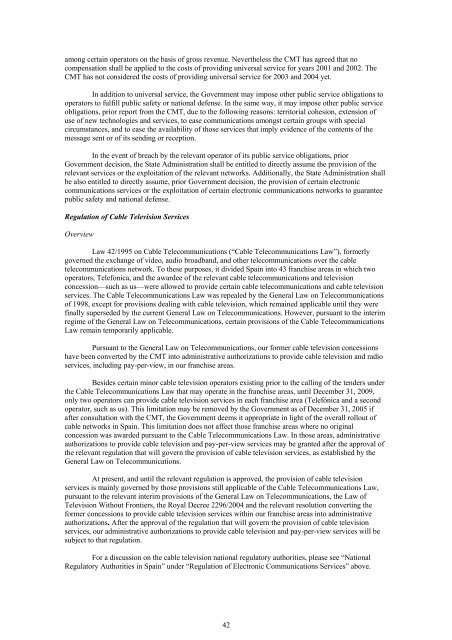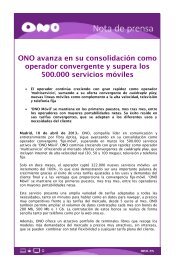Annual report (20-F) - Ono
Annual report (20-F) - Ono
Annual report (20-F) - Ono
You also want an ePaper? Increase the reach of your titles
YUMPU automatically turns print PDFs into web optimized ePapers that Google loves.
among certain operators on the basis of gross revenue. Nevertheless the CMT has agreed that no<br />
compensation shall be applied to the costs of providing universal service for years <strong>20</strong>01 and <strong>20</strong>02. The<br />
CMT has not considered the costs of providing universal service for <strong>20</strong>03 and <strong>20</strong>04 yet.<br />
In addition to universal service, the Government may impose other public service obligations to<br />
operators to fulfill public safety or national defense. In the same way, it may impose other public service<br />
obligations, prior <strong>report</strong> from the CMT, due to the following reasons: territorial cohesion, extension of<br />
use of new technologies and services, to ease communications amongst certain groups with special<br />
circumstances, and to ease the availability of those services that imply evidence of the contents of the<br />
message sent or of its sending or reception.<br />
In the event of breach by the relevant operator of its public service obligations, prior<br />
Government decision, the State Administration shall be entitled to directly assume the provision of the<br />
relevant services or the exploitation of the relevant networks. Additionally, the State Administration shall<br />
be also entitled to directly assume, prior Government decision, the provision of certain electronic<br />
communications services or the exploitation of certain electronic communications networks to guarantee<br />
public safety and national defense.<br />
Regulation of Cable Television Services<br />
Overview<br />
Law 42/1995 on Cable Telecommunications (“Cable Telecommunications Law”), formerly<br />
governed the exchange of video, audio broadband, and other telecommunications over the cable<br />
telecommunications network. To these purposes, it divided Spain into 43 franchise areas in which two<br />
operators, Telefonica, and the awardee of the relevant cable telecommunications and television<br />
concession—such as us—were allowed to provide certain cable telecommunications and cable television<br />
services. The Cable Telecommunications Law was repealed by the General Law on Telecommunications<br />
of 1998, except for provisions dealing with cable television, which remained applicable until they were<br />
finally superseded by the current General Law on Telecommunications. However, pursuant to the interim<br />
regime of the General Law on Telecommunications, certain provisions of the Cable Telecommunications<br />
Law remain temporarily applicable.<br />
Pursuant to the General Law on Telecommunications, our former cable television concessions<br />
have been converted by the CMT into administrative authorizations to provide cable television and radio<br />
services, including pay-per-view, in our franchise areas.<br />
Besides certain minor cable television operators existing prior to the calling of the tenders under<br />
the Cable Telecommunications Law that may operate in the franchise areas, until December 31, <strong>20</strong>09,<br />
only two operators can provide cable television services in each franchise area (Telefónica and a second<br />
operator, such as us). This limitation may be removed by the Government as of December 31, <strong>20</strong>05 if<br />
after consultation with the CMT, the Government deems it appropriate in light of the overall rollout of<br />
cable networks in Spain. This limitation does not affect those franchise areas where no original<br />
concession was awarded pursuant to the Cable Telecommunications Law. In those areas, administrative<br />
authorizations to provide cable television and pay-per-view services may be granted after the approval of<br />
the relevant regulation that will govern the provision of cable television services, as established by the<br />
General Law on Telecommunications.<br />
At present, and until the relevant regulation is approved, the provision of cable television<br />
services is mainly governed by those provisions still applicable of the Cable Telecommunications Law,<br />
pursuant to the relevant interim provisions of the General Law on Telecommunications, the Law of<br />
Television Without Frontiers, the Royal Decree 2296/<strong>20</strong>04 and the relevant resolution converting the<br />
former concessions to provide cable television services within our franchise areas into administrative<br />
authorizations. After the approval of the regulation that will govern the provision of cable television<br />
services, our administrative authorizations to provide cable television and pay-per-view services will be<br />
subject to that regulation.<br />
For a discussion on the cable television national regulatory authorities, please see “National<br />
Regulatory Authorities in Spain” under “Regulation of Electronic Communications Services” above.<br />
42
















